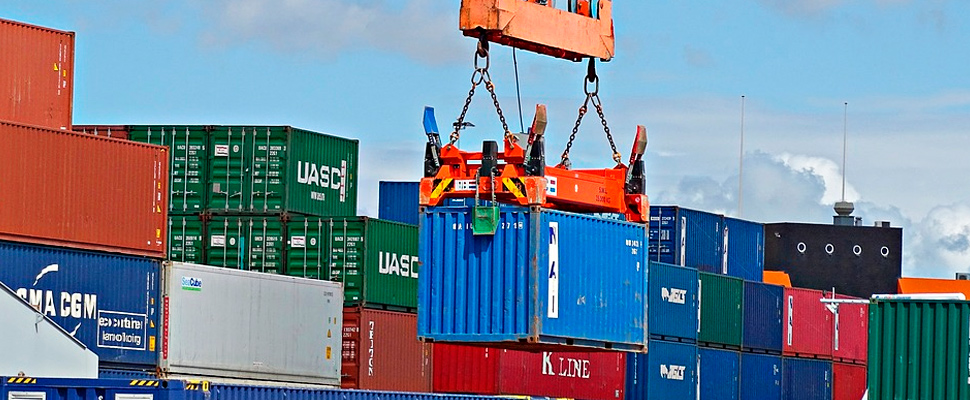Are China and the U.S minimizing trade war?
China announced its first batch of tariff exemptions for 16 types of U.S. products, days ahead of a planned meeting between trade negotiators from the two countries to try and de-escalate their bruising tariff row.

Container being lifted by a crane in a port. / Reference image / Pixabay
Reuters | Yawen Chen and Dominique Patton
Listen to this article
Leer en español: ¿Están China y los Estados Unidos minimizando la guerra comercial?
The exemptions will apply to U.S. goods including some anti-cancer drugs and lubricants, as well as the animal feed ingredients whey and fish meal, the Ministry of Finance said in a statement on its website on Wednesday.
Beijing said in May that it would start a waiver programme, amid growing worries over the cost of the protracted trade war on its already slowing economy.
Some analysts view the move as a friendly gesture but don't see it as a signal that both sides are readying a deal.
"The exemption could be seen as a gesture of sincerity towards the U.S. ahead of negotiations in October but is probably more a means of supporting the economy," ING's GreaterChina economist Iris Pang wrote in a note.
"There are still many uncertainties in the coming trade talks. An exemption list of just 16 items will not changeChina's stance," she said.
Indeed, the exempted list pales in comparison to over 5,000types of U.S. products that are already subject to China'sadditional tariffs. Moreover, major U.S. imports, such as soybeans and pork, are still subject to hefty additional duties, as China ramped up imports from Brazil and other supplying countries.
Beijing has said it would work on exempting some U.S.products from tariffs if they are not easily substituted from elsewhere. The United States is by far China's largest supplier of whey, which is an important ingredient in piglet feed and difficult to source in large volumes from elsewhere.
Analysts have noted that with duties on soybeans and other key imports such as U.S.-made cars, China is taking aim at a key political support base of U.S. President Donald Trump, mainly the factories and farms across the Midwest and South at a time of receding momentum in the world's top economy.
Read also: US imposes tariffs on structural steel from China and Mexico
China has imposed several rounds of duties on U.S. goods in retaliation against U.S. Section 301 tariffs, beginning last year in July and August with a 25% levy on about $50 billion ofU.S. imports.
In all, the world's two largest economies have slapped tit-for-tat tariffs on hundreds of billions of dollars worth of goods in a bitter trade war that has dragged on for well over a year and raised the specter of a global recession.
The items on the two tariff exemption lists – posted on the ministry's website – will not be subject to additional duties imposed by China on U.S. goods "as countermeasures to U.S.Section 301 measures", the ministry said in its statement.
The exemption will take effect on Sept. 17 and be valid fora year through to Sept. 16, 2020, it said.
ING's Pang noted the United States had also exempted imports of 110 Chinese products from tariffs in July, including high-value products such as medical equipment and parts.
Also read: USA vs China: Latin American currencies suffer with the trade war
TALKS
Wednesday's announcement comes before Chinese trade deputies are expected to meet with their U.S. counterparts in mid-September in Washington. That will be followed by highly-anticipated minister-level meetings in early October in the U.S. capital, involving Chinese Vice Premier Liu He, U.S.Trade Representative Robert Lighthizer and Treasury SecretarySteven Mnuchin.
For two years, the Trump administration has sought to pressure China to make sweeping changes to its policies on intellectual property protection, forced transfers of technology to Chinese firms, industrial subsidies and market access.
Beijing and Washington were close to a deal last spring butU.S. officials said China backed away from an agreed text over a reluctance to change laws to address U.S. complaints.
The South China Morning Post reported https://bit.ly/2manJ5q,citing an unidentified source, that China was expected to buy more agricultural products in hopes of a better trade deal with the United States.
But senior White House adviser Peter Navarro tamped down expectations for the next rounds of trade talks, urging investors, businesses and the public to be patient about resolving trade dispute.
The Finance Ministry said it will consider more products tobe exempted and will make further announcements "at appropriate times".
Earlier on Wednesday, a survey by a prominent American business association showed the trade war is souring the profit and investment outlook for U.S. companies operating in the world's second-biggest economy.




